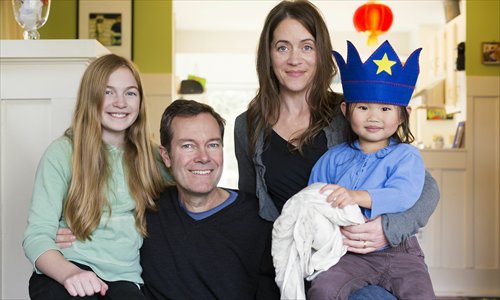As China continues to develop, some foreign foster parents move to China to settle down with their adopted Chinese children

Children adopted from China may find more opportunities by returning to their birthplace. Photo: IC
Thirteen-year-old Clarisse and her skinny 8-year-old brother arrive in the Beijing airport from Canada with their two Canadian parents. She and her brother, both yellow-skinned and dark-eyed, can feel the stares from people around them who are puzzled by the strange combination of two Western parents with two Chinese children.
The staff and people at the airport kept speaking to Clarisse in Chinese; she replied with an awkward facial expression and the Chinese words tingbudong (I don't understand you), and jianadaren (I am Canadian).
"I was so tired. They kept speaking to me in Chinese and assuming that I was Chinese, but I am not. I am Canadian," the Chinese-looking girl said, ending her sentence with a few French words.
Clarisse was adopted by a Canadian couple, Paul and Catherine, 12 years ago from Hunan Province when she was only 18-month-old. Her little brother Victor was also adopted from the same province, years later.
Three weeks ago, the family landed in Beijing, but they are not here for a short visit, or looking for their birth parents, they have left everything in Canada behind, and came to Beijing to settle down long-term.
According to a report by The Wall Street Journal in November 2014, since the early 1990s, more than 120,000 Chinese children were adopted by Western parents.
In recent years, as China's economy is developing rapidly and the international influence is increasing, more foreign foster parents are coming to China with their Chinese adoptees, to work, study or even settle down. In the process, their Chinese adoptees are trying to find a way to relate to the Chinese culture.

Foreign parents of children adopted from China, say the open environment and diversified international community in Beijing make it easy for their adopted Chinese children to fit in. Photo: IC
Opportunity knocks
The couple decided to return to China because they believe their family can enjoy more opportunities here than in Canada. China is developing rapidly, the quality of the education is better and most importantly, they fell in love with China 12 years ago when they adopted Clarisse.
Paul and Catherine got married in 2002, and discovered that they could not have children. Since the success rate of in-vitro was only 30 percent, the couple decided to adopt.
At that time, they knew families in their neighborhood who had adopted Chinese children, and learned it was easier and more accessible to adopt children from China.
The couple still remembers the first time they held Clarisse in their arms.
"It was love at first sight, and there were so many emotions. We had loved her for so long even before we met her, just from the photo the agency gave us of her," Catherine recalled.
The children had a good life in Canada. Clarisse told Metropolitan proudly that she is a straight A student and can play three instruments. Victor is also a very talented musician, and plays piano very well.
Now that Clarisse and Victor are getting older, the couple decided to move the entire family to Beijing.
One of the reasons the couple decided to move to China was better job opportunities.
In Canada, the economy is not as strong as it was in the past, so there are not as many good job opportunities. Paul taught history, literature and geography in a high school in Canada for 15 years. Now he is in his 50s, and people in his school suggested that he should retire and allow vacancies for younger people.
"When I was working in Canada, my colleagues kept telling me that I was too old to teach, but I did not agree. I have 30 years' experience in teaching, and I am at my prime," Paul said.
While in China, Paul received three job offers within two weeks, and the school he currently works for treats him as an expert in his field due to his years of experience.
Some colleagues will consult him when encountering any problems in teaching. The pay is also higher than in Canada.
Actually, the idea of working in China was planted in the couple's minds 12 years ago.
"I remember when we were waiting to complete some processes in the local social affairs department, there was a school nearby, and we took a walk around the area. The neighborhood was so lively and the children in the school all behaved so well. I told my wife then that I would love to work here," Paul said.
For Catherine, although she already had a good job as a communication counselor in a governmental organization, a permanent position with a good salary, it was not her passion. She wanted to work in a media agency as a journalist or narrator, but the job opportunities in Canada were hard to come by without strong connections, she said.
"But in China, although I have only been here for three weeks, I have already received a job for dubbing and waiting for another interview to be a journalist. I feel my qualifications are well recognized here."
Another reason they moved to China is they believe the quality of the education in China is better than in Canada.
"The math programs are much more advanced; we have read many reports that some schools in the UK are also adopting the Chinese math teaching system. The children are better behaved, so teachers do not have to use as much time disciplining the children, and this allows more time for teaching, and a better education," Catherine said.
"There are so many things happening in China and we like the energy here. There are so many more opportunities here than in Canada and we want our children to have the best opportunities in life."
Concerns and the future
Although born in China, Clarisse admitted to her mother that she had concerns about coming back to China since she cannot speak the language. She is also afraid she cannot make new friends once she moves.
For the international adoptees, when going back to China, there will definitely be a sense of alienation and dissonance. The initial sense of coming home can be undercut by their unfamiliarity with language and customs.
There are currently no official statistics about the number of international adoptees who have come back to China, and how long they have stayed. According to a Xinhua News report in June 2016, on the governmental level, since 2006, more than 4,000 adopted children, a large portion of whom were adopted by American families, have been invited by China Center for Children's Welfare and Adoption under the Ministry of Civil Affairs, to China to visit and help boost the cultural exchanges between China and the US.
According to a Global Times report in January 2014, for many international adoptees, when they get older and come back to China for school or work, they will face trouble fitting in.
The report told the story of a girl named Jenny who was adopted by an American family at the age of eight. After she got her bachelor's degree, she came back to China to find a job.
However, she has failed to secure a job because the employers thought she is neither American nor Chinese.
Since Clarisse is almost a teenager, she is at the age where one begins wondering about his or her cultural identity.
Both Clarisse and Victor will go to a bilingual school with many local students. Catherine said that she has some concerns about her children fitting in.
"We told them we are just as nervous as they are about moving to China, and we will be adjusting to life there together as a family, so there is nothing to be afraid of," Catherine said.
Both of them fit in easily in Canada. Quebec, where they come from, is a city made up of people from different countries, so they are used to communicating with people from different cultural background.
"In some ways, Beijing is a lot like Quebec. The international community in Beijing is big; there are people from different countries and backgrounds. No matter their race, color, age and size, they can all call this city home. And most Chinese people are very friendly. I am sure the kids will fit in perfectly here in the international and local community," Catherine said.
During their stay in China, they plan to travel the country, and take the children back to their birthplace. "We will take a photo in Wal-Mart [in Hunan Province], the supermarket where Victor was found," Catherine said.
For Clarisse, China is not what she can call home yet.
"I have no friends in here, and the school I am about to go is totally unfamiliar. I have to adjust in there like other foreigners," she said.
Newspaper headline: Back to the motherland